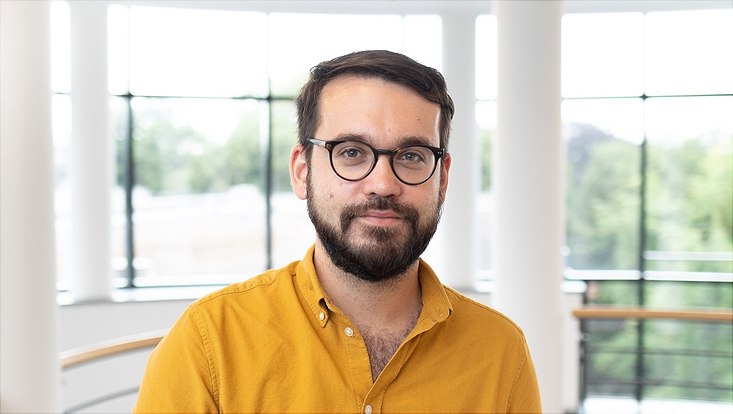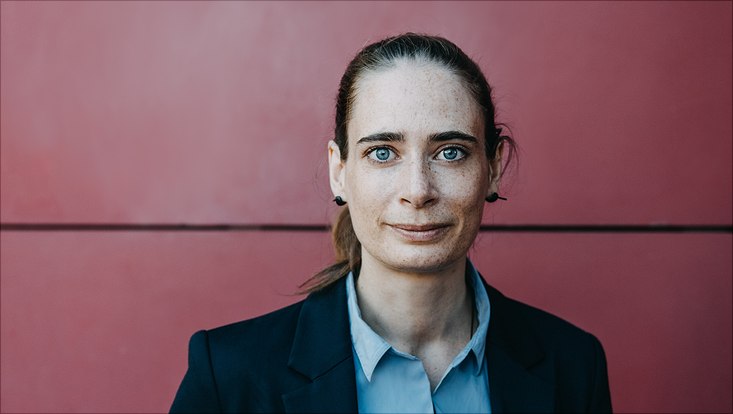“Welcome Aboard!”“More linguistic knowledge about sexual and gender identities advances understanding.”Prof. Dr. Lars strengthens the humanities.
4 October 2022, by Vorberger/Newsroom

Photo: UHH/Lutsch
Every year, Universität Hamburg welcomes several new researchers. This series introduces them and their areas of research. This time, we introduce linguist Prof. Dr. Lars Vorberger.
Prof. Dr. Lars Vorberger started his Professorship for German Linguistics at Universität Hamburg in winter semester. Prior to that, he worked at the University’s Equal Opportunity Unit, where he was responsible for the diversity section.
My research area in 3 sentences:
As part of my professorship, I would like to focus my research on the complex relationships between language and sexuality and gender. We talk about queer and gender linguistics, meaning, for example: How are these identities linguistically constituted? How do ideas about sexuality and gender affect our language? And, vice-versa: How does language affect our ideas? I want to focus especially on the auditory level, meaning phonetics and phonology, which in turn has a connection to research on regional languages, which had previously been my main area and in which I want to continue my research. In addition, the research area of language and sexuality yields further exciting points of contact, for example, to forensic linguistics, psychology, sociology, or education science.
I explain what I do to my friends and family as follows:
I often imitate Hape Kerkeling’s parody “Gay man at a café.” I normally don’t have to wait for a reaction and it’s a great starting point: people laugh, my imitation or rather Kerkeling’s parody has thus successfully provided a concept of “gay pronunciation.” That means there is a socially shared concept about how gay men stereotypically speak. In Germany, this has seldom been researched. Interestingly, there are differences between languages: In German, previous findings reveal a (de)nasal pronunciation, in English, however, a lisp. This, in turn, impacts the view of sexual identities, which seem to be culture-bound. This was one example of a line of inquiry. Others focus on, for example, how sexual identities are presented in the media or what impact feminine nouns or feminine forms such as “die Memme,” “die Bürgerin,” “Schwester” (“sissy,” “citizen,” “sister”) or universal terms such as “Feuerwehrleute” (“firefighters”) have on us.
In Hamburg, the city and the University, I am looking forward to:
Of course, I already live in Hamburg and I know Universität Hamburg—I completed my bachelor’s at the Institute for German Language and Literature and worked in the Equal Opportunity Unit. So for me, it feels more like a return.
I feel a very close connection to the city. Even though I am Hessian at heart, Hamburg is my adopted home. I got to know the University differently, from an administrative perspective, in my equal opportunity work, which is no doubt helpful. For this reason, I am familiar with the sound research and teaching conditions at the University and the Faculty of Humanities and I am looking forward to the cooperation with colleagues and students.
These are my plans at Universität Hamburg:
I would like to continue discovering the research area of language and sexuality and to establish it within the German university landscape at Universität Hamburg. There is not much research in this field, contrary to the English-language landscape. It concerns current and relevant social topics that I want to handle in my courses and that I want to transmit to society at large. Furthermore, there are exciting points of contact to existing research in different subjects at the University—the research field lives from its immanent interdisciplinarity and the job is to tap into that.
This is why students should come to my lectures:
First, my courses concern what is, for Germans, a quite new research field, opening up numerous possibilities: there is much to research and discover. I would like to pursue these together with my students and also let them oversee their own small empirical research projects. Furthermore, there are, as said, very topical lines of inquiry that, among other things, can be very important for teacher training students but that all of us can understand because sexuality and gender are nearly omnipresent. I hope that my huge interest and my enthusiasm for the research field will inspire my students.
Reaching out to the world: I work with the following international and federal institutions and universities. . .
So far, I had—due to my focus on the regional languages of Germany—no international cooperation. But I do have contacts, especially in the United States, but also in Sweden. I would like to intensify this exchange. The research field is not only interdisciplinary but international, so that a comparison with other languages and cultures seems promising.
My research is important to society because:
Gender-neutral and diversity-sensitive language, which is also part of my research and teaching, is immediately socially relevant. The topic is still being intensively discussed and it is socially controversial, so previous and future findings can be enlightening. And the research on the relationship between language and sexuality can have important social consequences: greater linguistic knowledge about sexuality and sexual and gender identities, for example, on the construction of personality, cultural connection, linguistic mechanisms, or stereotypes, advances understanding. At best, it can reduce prejudice and discrimination while advancing diversity, which seems in the actual discourse on gender and sexuality more urgent than ever.


